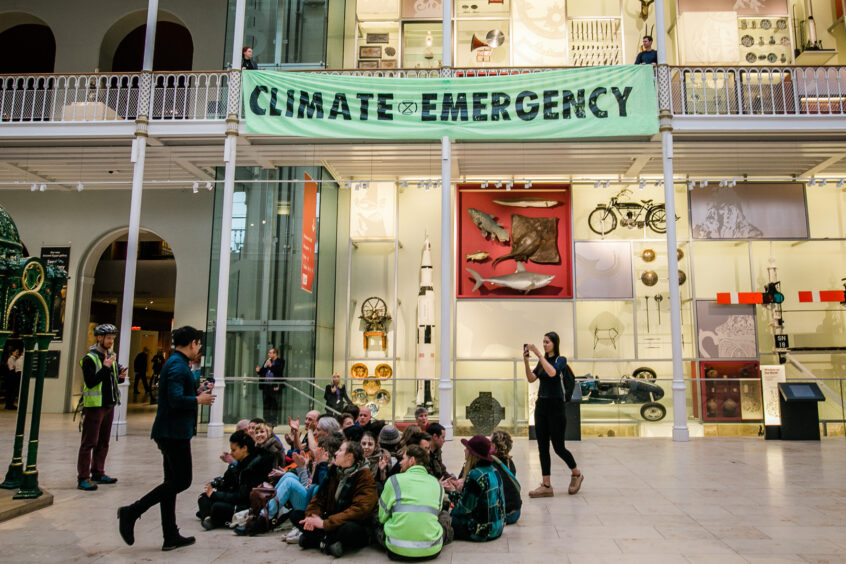
Extinction Rebellion has claimed Police Scotland was “dangerous and disproportionate” in using a circular saw to help remove protestors from a Scottish Oil Club event.
The activist group made two complaints to the police following the incident in March 2019 at the National Museum of Scotland in Edinburgh, but neither were upheld.
A new report published by the Police Investigations and Review Commissioner (PIRC) has detailed the complaints and assessed the force’s handling of them.
The watchdog found that Police Scotland had “shortcomings” in its response to the complaints, which centred around use of the saw and what Extinction Rebellion deemed a violation of human rights, adding that the responses were not handled to a reasonable standard.
Police Scotland said it noted the review and is considering the findings.
A spokesperson said it has a “duty to protect” peaceful protestors but “this has to be balanced against the rights of the wider community”.
Extinction Rebellion protestors linked themselves by the neck using D-locks during the incident on March 8 2019 in protest to a dinner being held by the Scottish Oil Club at the venue, when officers used a circular saw to help cut them out.
Police Scotland’s response to the complaints, published by the PIRC, outline that protestors were appealed to several times prior to the operation, and given “numerous opportunities to self-release” prior to and during the process.
Steps were also to protect protestors from cutting techniques through use of a kevlar blanket, goggles and a helmet provided to them.
A “simple to complex” approach was taken, with officers using bolt cutters and a grinder first, but the strength of the bicycle D-locks required the saw.
However Extinction Rebellion argued that it amounted to “dangerous methods by the state”.
The PIRC said that, in its handling of the complaint, Police Scotland “did not adequately explain whether the use of the saw was proportionate to the nature of the alleged offence”.
It added that it agreed that the response did not sufficiently consider ’whether the disruption of a dinner event necessitated the use of industrial cutting equipment’.”
Extinction Rebellion also complained about what is said was a violation of protestor’s right to assembly.
In its response, Police Scotland said “full consideration to the positive and negative obligations in respect of Article 11 ECHR (Right to Assembly) were assessed”, and officers determined that protestors had committed an offence of breach of the peace.
It was therefore “necessary and proportionate” to use the saw in order to make the arrests, Police Scotland said.
However, officers had characterised the protest as “peaceful” in their report and the PIRC said the force needs to address whether that is a contradiction with the claimed offence.
The watchdog also said Police need to explain whether, and if so why, the protestors’ actions were considered severe enough to have caused significant alarm and in what way the conduct was deemed likely to cause serious disturbance to the community.
All charges were dropped against the arrested protestors by May 2019.
Police Scotland has two months to address the issues in the response.
A spokesperson said: “Our response is always proportionate and in this case the protesters were given time to protest before officers acted, using removal tactics only after they refused to comply with multiple requests to unlock themselves.
“The release of protesters from lock-ons was carried out by officers specially trained in the use of specialist cutting equipment. This ensures the safety and protection of protesters and officers.”
